| Srl | Item |
| 1 |
ID:
106540
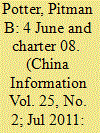

|
|
|
|
|
| Publication |
2011.
|
| Summary/Abstract |
This article will examine the dissident human rights document circulated in China under the title 'Charter 08' by comparison with the 4 June 1989 democracy movement as exercises of popular remonstrance. The document entitled 'Charter 08' juxtaposes continued deprivation of human rights in China with continued reliance on ineffective and corrupt institutions of the rule of law and concludes that China has many laws but lacks the rule of law. Charter 08 offers a series of principles and policy proposals for wide-ranging legal and political reform, from constitutional reforms to a proposal for a truth and reconciliation process that will confront the tragedies of China's political history and build a foundation for future unity. The 4 June democracy movement in Beijing and other cities in China centred on similar concerns around political and legal reform - particularly the need to curb corruption and build institutional restraints against abuse of power by officials. This article will examine similarities and differences between Charter 08 and 4 June as a way to further understanding of the potential legacy of Charter 08 in the discourse of political and legal reform in China.
|
|
|
|
|
|
|
|
|
|
|
|
|
|
|
|
| 2 |
ID:
115347
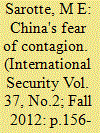

|
|
|
|
|
| Publication |
2012.
|
| Summary/Abstract |
The Tiananmen Square massacre of June 1989 remains a taboo topic in the People's Republic of China (PRC); the ruling Chinese Communist Party (CCP) still detains participants and suppresses online, popular, and scholarly discussions of it. The twentieth anniversary of the end of the transatlantic Cold War, however, saw the release of new sources from high-level contacts between the CCP and foreign leaders. These new sources, combined with older ones, show the extent to which Chinese political leaders were obsessed with the democratic changes in Eastern Europe and were willing to take violent action to prevent similar events on their territory. This obsession has received mention from a few scholars, but until now it has played too small a role in the current understanding of Tiananmen. New evidence documents that one of the main motivations for the CCP in deploying the army in June 1989-on the same day as semi-free elections in Poland-was its desire to combat possible contagion from the events in Europe. These sources also show that the CCP knew it had little to fear from reprisals by the United States, which it predicted would take "no real countermeasures."
|
|
|
|
|
|
|
|
|
|
|
|
|
|
|
|
| 3 |
ID:
056547
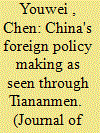

|
|
|
| 4 |
ID:
020747
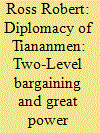

|
|
|
|
|
| Publication |
Winter 2000/01.
|
| Description |
139-178
|
|
|
|
|
|
|
|
|
|
|
|
|
|
|
|
| 5 |
ID:
169964
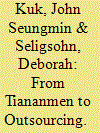

|
|
|
|
|
| Summary/Abstract |
Mounting import competition from China has increased unemployment in manufacturing and suppressed wages in local labor markets around the United States. This article investigates the political effects of this China trade shock, using a unique dataset of the district-level economic impact of Chinese imports to the United States. The liberalization of trade following China’s accession to the World Trade Organization increased political polarization among American voters and encouraged legislators in economically hard-hit districts to take positions hostile to China. The result is that Congress is even more hostile towards China today than in the aftermath of the Tiananmen Massacre. After 2003, members of Congress who voted against China were more likely to come from districts that were adversely impacted by import competition, controlling for ideology and partisanship. By contrast, import competition was not a significant predictor of earlier congressional opposition to granting most-favored-nation status to China (suggesting that voting on these crucial pieces of legislation was driven by non-economic concerns such as human rights). Far from being the political win–win its proponents envisioned, trade has eclipsed human rights and Taiwan as the main driver of hostility to China in Congress.
|
|
|
|
|
|
|
|
|
|
|
|
|
|
|
|
| 6 |
ID:
116494
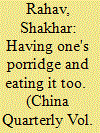

|
|
|
|
|
| Publication |
2012.
|
| Summary/Abstract |
This article examines the "porridge incident," in which the renowned Chinese author, critic and former minister of culture Wang Meng sued a Communist Party literary journal for attacking him and his story "Hard Porridge" ("Jianying de xizhou"). The incident straddled the transitional period between 1989 and 1992 and illuminates the ramifications of structural changes in China's literary sphere. I frame the affair within two contexts: Wang Meng's tortuous career, which challenges dichotomies of bureaucrat vs. dissident, and the transition from a centralized literary sphere to a market-driven one. I argue that Wang's responses to the attack on him stemmed from a political and cultural standing that was the product of a Party-controlled cultural sphere, along with the opportunities offered by expanding reforms. The Deng-era reforms produced a divide between culture, markets and bureaucracy that would preclude cultural figures like Wang from holding such high bureaucratic positions anymore.
|
|
|
|
|
|
|
|
|
|
|
|
|
|
|
|
| 7 |
ID:
149565
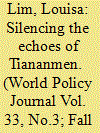

|
|
|
|
|
| Summary/Abstract |
Journalist Louisa Lim describes how the Chinese Communist Party has compelled China to forget the bloody crackdown around Tiananmen Square in 1989. To create this national amnesia, the government repressed political ambitions and funneled aspirations toward the economic sphere—a worrying fact for the Communist Party as the country’s GDP growth slows.
|
|
|
|
|
|
|
|
|
|
|
|
|
|
|
|
| 8 |
ID:
018393
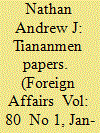

|
|
|
|
|
| Publication |
Jan-Feb 2001.
|
| Description |
2-49
|
|
|
|
|
|
|
|
|
|
|
|
|
|
|
|
| 9 |
ID:
093338
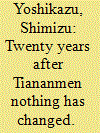

|
|
|